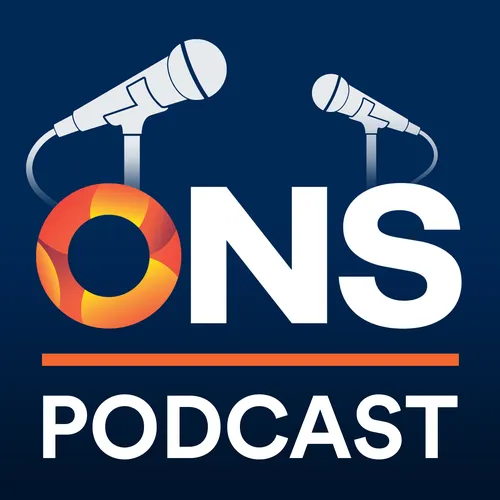
The ONS Podcast
Where ONS Voices Talk Cancer
Join oncology nurses on the Oncology Nursing Society's award-winning podcast as they sit down to discuss the topics important to nursing practice and treating patients with cancer.
ISSN 2998-2308
- Update frequency
- every 7 days
- Average duration
- 34 minutes
- Episodes
- 383
- Years Active
- 2017 - 2025

Episode 260: Diversity in Cancer Clinical Trials
“I think it’s important to ensure that you consider each person uniquely. Because no matter how much I know or the nurse knows about the population, everybody is a little bit different. It’s really i…

Episode 259: Patient Education for Health Literacy and Limited English Proficiency
“I think there’s a big misconception that health literacy means someone’s ability to read or write, and really it’s much more than that,” ONS member Regina Carlisle, MS, BSN, RN, OCN®, senior cancer …

Episode 258: ONS Through the Ages: Stories From the Early Days With Cindi Cantril and George Hill
“The reason that oncology nursing developed at the moment it did was from you and the other few people who were real leaders in your field. . . . It happened in that particular moment because of you …

Episode 257: Redefining the Bell: The Ethics of Hope for Oncology Nurses and Patients
“The bell can have so much more meaning and significance than just the end of treatment. So, work with your patients to define what the significance of that bell can mean,” ONS member Monica Cfarku, …

Episode 256: Cancer Symptom Management Basics: Hematologic Complications
“When someone is faced with a cancer diagnosis, you want to really try to work to make that patient an active part of their care team. Understand that there are things out of their control, but there…

Episode 255: Public Thanks for Deserving Oncology Nurses
Oncology nurses provide remarkable care every day, without even realizing the impact it has on their patients and families. Organizations like the DAISY Foundation provide a meaningful way for patien…

Episode 254: Oncology Nursing Certification Affects the Entire Cancer Care System
“Certification increases nurses’ knowledge, ensures that they are up to date on cancer care, and helps them to be prepared to effectively manage symptoms associated with cancer and cancer treatments.…

Episode 253: The Ethics of Caring for People You Know Personally
“Nursing ethics is relationship centered because when your friend, family member, or colleague becomes a patient, that relationship can’t be uninformed by how you know that person before they got sic…

Episode 252: Intraperitoneal Administration: The Oncology Nurse’s Role
“Before you even get started, you have to do your checks. Just like you do with a regular systemic infusion. You’re going to be doing your physical assessment prior to starting your patient, looking …

Episode 251: Palliative Care Programs for Patients With Cancer
“The idea of early palliative care was really a strategy for preventing people from going through unnecessary and unwanted suffering, treatments, and things that were not consistent with their values…

Episode 250: Cancer Symptom Management Basics: Dermatologic Complications
“Sometimes when we talk about skin toxicities, it can get lost in translation for these patients when we start talking about nausea, vomiting, all those other things. . . . They don’t take into consi…

Episode 249: Developmental Disabilities and Cancer
“We as oncology nurses have to understand who is this patient, where do they come from, and who is going to touch that patient, so that we can provide comprehensive, good care without these barriers,…

Episode 248: The Basics of Evidence-Based Practice for Every Oncology Nurse
“Evidence-based practice is asking the right clinical question, searching the evidence and then really appraising and determining what is the quality of the evidence, and synthesizing it to move forw…

Episode 247: Tobacco Treatment for Patients With Cancer
“It’s the oncology nurse who might be the only cheerleader this person has to keep them motivated moving forward. We need to make sure our patients’ motivation and competence stay high so that they c…

Episode 246: Create a Culture of Safety: Fair and Just Culture
“I love the motto, ‘If you see a problem, you can solve a problem.’ So, no matter what level you fall on on the clinical ladder or within your administration, you always have the opportunity to promo…

Episode 245: Biosimilar Basics for Oncology Nurses and Patients
“The way I approach patient education conversations is to discuss it, address it, but not to emphasize it. I really like to focus on what the drug is. I mention if it’s a biosimilar, I explain it, I …

Episode 244: Cancer Symptom Management Basics: Cardiovascular Complications
“When I draw the interprofessional team for the management of cardio-oncology patients, I always place nurses in the center of it, besides the patient, because nurses are the eyes and ears of interpr…

Episode 243: Culturally Competent Cancer Care
“Cultural competence is about being able to deliver care while respecting and valuing the differences people bring with them to the table. Did we consider their uniqueness? Have we done our best to c…

Episode 242: Oncology Pharmacology 2023: Today’s Treatments and Tomorrow’s Breakthroughs
“It’s incumbent on us as nurses to stay informed about these newly approved drugs or new indications in drugs because we’re the front line in helping these patients manage adverse events,” Teresa Kno…

Episode 241: 2023 Is Your Year to Advocate With ONS
“It’s important for all nurses to advocate—for themselves, for their practice, for their profession, for their patients. Without the nursing community advocating for itself, no other entity will. It …